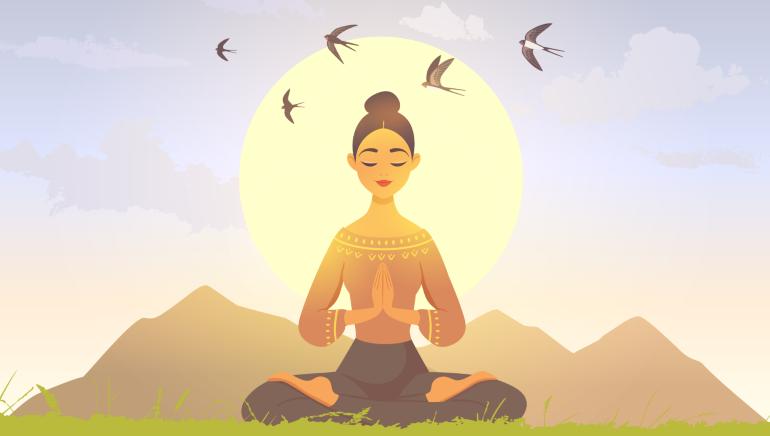What is the best book about philosophy one could look at? For Lao Tzu, it wasn’t a volume (or a scroll) but the book of nature. It is the natural world, in particular its rocks, water, stone, trees and clouds, that offers us constant, eloquent lessons in wisdom and calm – if only we remembered to pay attention a little more often.
We live in the age of science and technology where everything is dynamic . The society we live in is extremely competitive, the survival of the fittest mentality is deeply entrenched in our culture. We believe that to be successful it is important that we must have drive, commitment and determination , " we should never give up" , "never compromise" etc . These thoughts can stir up anxieties , make it harder for us to cope and acts as poison in certain cases. For these cases Laozi's Daoism philosophy acts like an ideal antidote. To flow with the changing times , we need to embrace changes and stop clinging on to the past so that we can enjoy the life fully.
1) "To the mind that is still,
The whole Universe surrenders."
If we remain busy and too preoccupied with anxiety or ambition, we will miss a thousand moments of the human experience that are our natural inheritance.We need to let go of our schedules, worries and complex thoughts for a while and simply experience the world. Can you make the grass grow quickly by pulling it? Obviously no, we need to wait, nourish it with water and be patient. It is particularly important that we remember that certain things—grieving, growing wiser, developing a new relationship,—only happen on their own schedule, like the changing of leaves in the fall or the blossoming of the bulbs we planted months ago.
Laozi beautiful said that "Nature doesn't hurry , yet everything is accomplished. "
A river rarely takes a straight course, meandering instead through the natural shape of the landscape, keeping to the lowest points, moving around mountains and hills. But the water keeps flowing powerfully and eventually reaches the sea.Like nature, our own achievements can take time, and this is no bad thing. Thus, we ought to take more time for stillness and simply experience the world as it is.
When we are still and patient, we also need to empty our mind from frivolous thoughts that hinders us from observing what is really important. We should keep in mind that “the usefulness of a pot comes from its emptiness.” Lao Tzu said. “Empty yourself of everything, let your mind become still.” We need to be awake of the surroundings ie the way the birds fly, the way our loved ones laugh and talk, the way trees and plants dance when the wind passes by and the feeling against our face etc . These experiences reconnect us to parts of ourselves and brings us closer to the harmony of nature.
2) "Life is a series of natural and spontaneous changes.
Do not resist them.
That only causes sorrow."
The path of least resistance is sometimes the best path. The world is won by those who let it go. But when you try and try, the world is beyond winning. By letting it go it all gets done.
“When I let go of what I am,
I become what I might be. "
Like the caterpillar, you have to let go of what you are if you are to become a beautiful butterfly. To be in touch with our real selves , we need to let go of our failures, sorrows, regrets, old values and beliefs that are holding us back from our true potential.
In Lao Tzu’s eyes, most of what is wrong with us stems from our failure to live ‘in accordance with nature’. Our ego, our envy, our rage, our manic ambition, our frustrated sense of entitlement, all of it stems from our failure to live as nature suggests we should.
Lao Tzu liked to compare different parts of nature to different virtues.For instance, Laozi said, “The best people are like water, which benefits all things and does not compete with them. It stays in lowly places that others reject. This is why it is so similar to the Way (Dao).”
Each part of nature can remind us of a quality we admire and should cultivate within ourselves—being adaptable like water, to have the strength and dignity of the mountains, the resilience of trees, the kindness and cheerfulness of birds and flowers etc. The idea that the contemplation of nature is a source of perspective and tranquility is well known in theory, but so easy to overlook because we take it for granted – and never give it the time and focus required.
3) " Those who have knowledge, don't predict
Those who predict, don't have knowledge."
This quote should be viewed open-mindedly. Here, Laozi is being euphemistic and particularly referring to the knowledge of Tao. Knowledge and prediction
are phenomena that cannot be isolated from each other. Knowledge does help in prediction and
predictions can be beneficial as well. But it is also crucial to use knowledge wisely in order to
make sound predictions.
What he really wants us to question is: only those who are thirsty for knowledge make predictions, invite other knowledge seekers to prove or disprove the predictions, and in the process create new knowledge. Thus, they have delved deep into their chosen area of knowledge, have reached the boundary of the knowledge - or in the words of Lao Tzu: “don’t have knowledge” - are forced to make predictions to explore the next frontier.
On the other hand, those who have absolute knowledge, like the creationists, do not entertain the idea of enquiry of assumptions and predictions. Indeed, those who predict are wise because they know that they have insufficient knowledge. They try to predict where the next fountain of knowledge may be found.
"Those who know the Tao do not brag.
Those who brag do not know the Tao.
Put senses and desires under control.
Blunt the sharpness of the powerful,
and untangle the knot of the powerless;
soften the glare of the noble,
and stay with the humble.
This is the state of being one with the Tao.
Those obtaining this state
cannot be got closer or drifted apart,
benefited or harmed,
ennobled or humiliated.
Thus, they are truly respected by the people. "
Laozi talks about the attitude and its related behaviour of the true follower of Tao/Dao . If you speak about the Tao while feeling of yourself as superior, you are not a true follower of the Tao and do not actually know the Tao. The reason behind this is that the Tao is the innermost nature of all beings. Therefore, the Tao works behind the scenes and can represents the spirit of true humility, and benefits all beings without harming them or without competing with them for anything. The true followers of the Tao follow its guidance and always remain humble. Thus, they do not brag and show off, and do not hurt the feeling of others. And that is why they are truly respected by them.
In the end, life is unpredictable. The wind blows as it will, and life takes us in its own direction. Despite our search for certainty and a clear vision of the future, we cannot know what the future holds for us, what new lands we shall discover when our ship has been blown off course across the sea. All we can do is be open to possibilities , keep a vigilant eye for danger and be patient.
4.) " Be content with what you have.
Rejoice in the way things are."

We spend a great deal of time worrying about who we ought to become, but we should instead take time to be who we already are at heart. We might rediscover a generous impulse, or a playful side we had forgotten, or simply an old affection for long walks. Our ego is often in the way of our true self, which must be found by being receptive to the outside world rather than focusing on some critical, too-ambitious internal image.
It would be a mistake to take Laozi's teachings literally in all cases. To rejoice in the way everything happens would be foolish example wrongful imprisonment or accusation, being abused and tolerating injustice, addiction to drugs, pornography etc .
5) "Heaven is everlasting and earth is enduring."
Only those who love others are capable of being loved by others.The reason that they are everlasting is because they do not exist for themselves.Hence, they are long lived. For example - all the great leaders such as Dr B.R Ambedkar, Gandhi, Martin Luther, Nelson Mandela etc are still remembered because they dedicated their lives for the betterment of people and society. Thus, although the saint puts himself last, finds himself in the lead. Although he is not self-concerned, finds himself accomplished. It is because he is not focused on self-interests and hence can fulfill his true nature.






No comments:
Post a Comment
If you have any doubts. Please let me know..